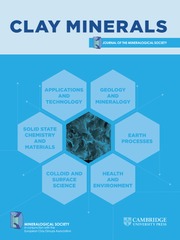Article contents
Dissolution behaviour of soil kaolinites in acidic solutions
Published online by Cambridge University Press: 09 July 2018
Abstract
Highly weathered soils of the tropics and subtropics commonly have kaolinitedominated clay fractions. Under acidic conditions prevailing in these soils kaolinite dissolution occurs, contributing to the high levels of soluble Al in these soils. This study evaluates the dissolution behaviour of kaolinites from subsurface horizons of highly weathered soils from Thailand, along with a soil kaolinite from Western Australia (WA kaolinite) and Georgia kaolinite (KGa-2). Kaolinite-dominated clay fractions were isolated from soils by sedimentation and chemically treated to remove iron oxides. The dissolution rate of kaolinites was measured in 0.01 M NaCl as a function of pH (1–4; HCl) at 25±1°C using non-stirred flow-through reactors. Kaolinite dissolution rates were calculated from the release of Al and Si at the steady state. In most of the experiments and at all pH values, the release of both Si and Al underwent a distinct transition from an initial period of rapid release to significantly slower release at the steady state. Aluminium and Si concentrations at the steady state were higher for soil kaolinites than the reference sample (KGa-2). At the steady state the dissolution of all kaolinites was stoichiometric except for the soil kaolinites from Thailand at pH 4, where the Al/Si ratio was well below the stoichiometric ratio. Log dissolution rate (RSi) of soil kaolinites ranged from –13.75 to –12.51, with the dissolution rate increasing significantly with decreasing solution pH. However, the dissolution rate was similar or pH independent between pH 2 and 3, which is the pH range of the point of zero net charge (PZNC) for both soil and reference kaolinites. The dissolution rate of soil kaolinite was significantly higher than the KGa-2 sample at pH < 3. The results obtained on kaolinite samples from highly weathered soils show that in highly acidic systems kaolinite is a source of soluble Al. Soil kaolinites with poorly ordered small crystals dissolve faster than better crystalline reference kaolinite (KGa-2) with larger crystals.
Keywords
- Type
- Research Article
- Information
- Copyright
- Copyright © The Mineralogical Society of Great Britain and Ireland 2013
Footnotes
Present address: Institute of Soil and Environmental Sciences, University of Agriculture Faisalabad, Faisalabad 38040, Pakistan
References
- 15
- Cited by


